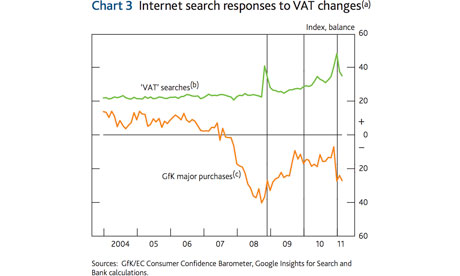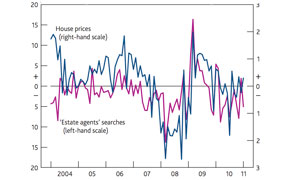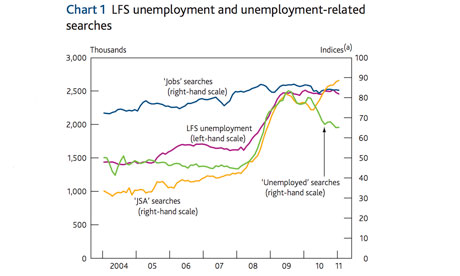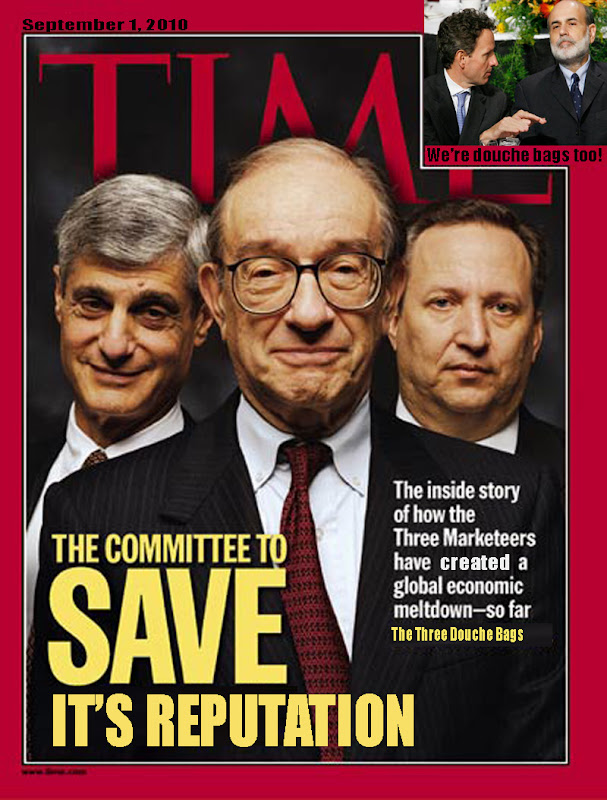And now Hudson, on familiar ground, but always enriching it with new insights and perspectives on the problem. His latest piece incorporates a lot of interesting European history, how the EU has gone astray from the original intents.
The craziest thing about the rabid threats to Greece is that the Greeks ultimately hold the cards. The German banks and the troika aren't going to invade Greece. (As we know, NATO's ready to invade a lot of places, but not Greece.) Furthermore, Papandreou won't stage a self-coup and the military won't either. Those days are done. Greece can default and there's naught the troika can do about it. Greeks will live in worse poverty without a default. They will have a chance to find a path to independent development after default. It's a question of a perceptual change, of walking through the forbidden door that stands wide open.
http://counterpunch.org/hudson06032011.html
Weekend Edition
June 3 / 5, 2011
Trichet Threatens Greece with Iron Heel
Europe's New Road to Serfdom
By MICHAEL HUDSON
Soon after the Socialist Party won Greece’s national elections in autumn 2009, it became apparent that the government’s finances were in a shambles. In May 2010, French President Nicolas Sarkozy took the lead in rounding up €120bn ($180 billion) from European governments to subsidize Greece’s unprogressive tax system that had led its government into debt – which Wall Street banks had helped conceal with Enron-style accounting.
The tax system operated as a siphon collecting revenue to pay the German and French banks that were buying government bonds (at rising interest-risk premiums). The bankers are now moving to make this role formal, an official condition for rolling over Greek bonds as they come due, and extend maturities on the short-term financial string that Greece is now operating under. Existing bondholders are to reap a windfall if this plan succeeds. Moody’s lowered Greece’s credit rating to junk status on June 1 (to Caa1, down from B1, which was already pretty low), estimating a 50/50 likelihood of default. The downgrade serves to tighten the screws yet further on the Greek government. Regardless of what European officials do, Moody’s noted, “The increased likelihood that Greece’s supporters (the IMF, ECB and the EU Commission, together known as the “Troika”) will, at some point in the future, require the participation of private creditors in a debt restructuring as a precondition for funding support.”
The conditionality for the new “reformed” loan package is that Greece must initiate a class war by raising its taxes, lowering its social spending – and even private-sector pensions – and sell off public land, tourist sites, islands, ports, water and sewer facilities. This will raise the cost of living and doing business, eroding the nation’s already limited export competitiveness. The bankers sanctimoniously depict this as a “rescue” of Greek finances.
What really were rescued a year ago, in May 2010, were the French banks that held €31 billion of Greek bonds, German banks with €23 billion, and other foreign investors. The problem was how to get the Greeks to go along. Newly elected Prime Minister George Papandreou’s Socialists seemed able to deliver their constituency along similar lines to what neoliberal Social Democrat and Labor parties throughout Europe had followed – privatizing basic infrastructure and pledging future revenue to pay the bankers.
The opportunity never had been better for pulling the financial string to grab property and tighten the fiscal screws. Bankers for their part were eager to make loans to finance buyouts of public gambling, telephones, ports and transport or similar monopoly opportunities. And for Greece’s own wealthier classes, the EU loan package would enable the country to remain within the Eurozone long enough to permit them to move their money out of the country before the point arrived at which Greece would be forced to replace the euro with the drachma and devalue it. Until such a switch to a sinking currency occurred, Greece was to follow Baltic and Irish policy of “internal devaluation,” that is, wage deflation and government spending cutbacks (except for payments to the financial sector) to lower employment and hence wage levels.
What actually is devalued in austerity programs or currency depreciation is the price of labor. That is the main domestic cost, inasmuch as there is a common world price for fuels and minerals, consumer goods, food and even credit. If wages cannot be reduced by “internal devaluation” (unemployment starting with the public sector, leading to falling wages), currency depreciation will do the trick in the end. This is how the Europe’s war of creditors against debtor countries turns into a class war. But to impose such neoliberal reform, foreign pressure is necessary to bypass domestic, democratically elected Parliaments. Not every country’s voters can be expected to be as passive in acting against their own interests as those of Latvia and Ireland.
Most of the Greek population recognizes just what has been happening as this scenario has unfolded over the past year. “Papandreou himself has admitted we had no say in the economic measures thrust upon us,” said Manolis Glezos on the left. “They were decided by the EU and IMF. We are now under foreign supervision and that raises questions about our economic, military and political independence.” On the right wing of the political spectrum, conservative leader Antonis Samaras said on May 27 as negotiations with the European troika escalated: “We don’t agree with a policy that kills the economy and destroys society. … There is only one way out for Greece, the renegotiation of the [EU/IMF] bailout deal.”
But the EU creditors upped the ante: To refuse the deal, they threatened, would result in a withdrawal of funds causing a bank collapse and economic anarchy.
The Greeks refused to surrender quietly. Strikes spread from the public-sector unions to become a nationwide “I won’t pay” movement as Greeks refused to pay road tolls or other public access charges. Police and other collectors did not try to enforce collections. The emerging populist consensus prompted Luxembourg’s Prime Minister Jean-Claude Juncker to make a similar threat to that which Britain’s Gordon Brown had made to Iceland: If Greece would not knuckle under to European finance ministers, they would block IMF release of its scheduled June tranche of its loan package. This would block the government from paying foreign bankers and the vulture funds that have been buying up Greek debt at a deepening discount.
To many Greeks, this is a threat by finance ministers to shoot themselves in the foot. If there is no money to pay, foreign bondholders will suffer – as long as Greece puts its own economy first. But that is a big “if.” Socialist Prime Minister Papandreou emulated Iceland’s Social Democratic Sigurdardottir in urging a “consensus” to obey EU finance ministers. “Opposition parties reject his latest austerity package on the grounds that the belt-tightening agreed in return for a €110bn ($155bn) bail-out is choking the life out of the economy.”
At issue is whether Greece, Ireland, Spain, Portugal and the rest of Europe will roll back democratic reform and move toward financial oligarchy. The financial objective is to bypass parliament by demanding a “consensus” to put foreign creditors first, above the economy at large. Parliaments are being asked to relinquish their policy-making power. The very definition of a “free market” has now become centralized planning – in the hands of central bankers. This is the new road to serfdom that financialized “free markets” are leading to: markets free for privatizers to charge monopoly prices for basic services “free” of price regulation and anti-trust regulation, “free” of limits on credit to protect debtors, and above all free of interference from elected parliaments. Prising natural monopolies in transportation, communications, lotteries and the land itself away from the public domain is called the alternative to serfdom, not the road to debt peonage and a financialized neofeudalism that looms as the new future reality. Such is the upside-down economic philosophy of our age.
Concentration of financial power in non-democratic hands is inherent in the way that Europe’s centralized planning in financial hands was achieved in the first place. The European Central Bank has no elected government behind it that can levy taxes. The EU constitution prevents the ECB from bailing out governments. Indeed, the IMF Articles of Agreement also block it from giving domestic fiscal support for budget deficits. “A member state may obtain IMF credits only on the condition that it has ‘a need to make the purchase because of its balance of payments or its reserve position or developments in its reserves.’ Greece, Ireland, and Portugal are certainly not short of foreign exchange reserves … The IMF is lending because of budgetary problems, and that is not what it is supposed to do. The Deutsche Bundesbank made this point very clear in its monthly report of March 2010: ‘Any financial contribution by the IMF to solve problems that do not imply a need for foreign currency – such as the direct financing of budget deficits – would be incompatible with its monetary mandate.’ IMF head Dominique Strauss-Kahn and chief economist Olivier Blanchard are leading the IMF into forbidden territory, and there is no court which can stop them.” (Roland Vaubel, “Europe’s Bailout Politics,” The International Economy, Spring 2011, p. 40.)
The moral is that when it comes to bailing out bankers, rules are ignored – in order to serve the “higher justice” of saving banks and their high-finance counterparties from taking a loss. This is quite a contrast compared to IMF policy toward labor and “taxpayers.” The class war is back in business – with a vengeance, and bankers are the winners this time around.
The European Economic Community that preceded the European Union was created by a generation of leaders whose prime objective was to end the internecine warfare that tore Europe apart for a thousand years. The aim by many was to end the phenomenon of nation states themselves – on the premise that it is nations that go to war. The general expectation was that economic democracy would oppose the royalist and aristocratic mind-sets that sought glory in conquest. Domestically, economic reform was to purify European economies from the legacy of past feudal conquests of the land, of the public commons in general. The aim was to benefit the population at large. That was the reform program of classical political economy.
European integration started with trade as the path of least resistance – the Coal and Steel Community promoted by Robert Schuman in 1952, followed by the European Economic Community (EEC, the Common Market) in 1957. Customs union integration and the Common Agricultural Policy (CAP) were topped by financial integration. But without a real continental Parliament to write laws, set tax rates, protect labor’s working conditions and consumers, and control offshore banking centers, centralized planning passes by default into the hands of bankers and financial institutions. This is the effect of replacing nation states with planning by bankers. It is how democratic politics gets replaced with financial oligarchy.
Finance is a form of warfare. Like military conquest, its aim is to gain control of land, public infrastructure, and to impose tribute. This involves dictating laws to its subjects, and concentrating social as well as economic planning in centralized hands. This is what now is being done by financial means, without the cost to the aggressor of fielding an army. But the economies under attacked may be devastated as deeply by financial stringency as by military attack when it comes to demographic shrinkage, shortened life spans, emigration and capital flight.
This attack is being mounted not by nation states as such, but by a cosmopolitan financial class. Finance always has been cosmopolitan more than nationalistic – and always has sought to impose its priorities and lawmaking power over those of parliamentary democracies.
Like any monopoly or vested interest, the financial strategy seeks to block government power to regulate or tax it. From the financial vantage point, the ideal function of government is to enhance and protect finance capital and “the miracle of compound interest” that keeps fortunes multiplying exponentially, faster than the economy can grow, until they eat into the economic substance and do to the economy what predatory creditors and rentiers did to the Roman Empire.
This financial dynamic is what threatens to break up Europe today. But the financial class has gained sufficient power to turn the ideological tables and insist that what threatens European unity is national populations acting to resist the cosmopolitan claims of finance capital to impose austerity on labor. Debts that already have become unpayable are to be taken onto the public balance sheet – without a military struggle, needless to say. At least such bloodshed is now in the past. From the vantage point of the Irish and Greek populations (perhaps soon to be joined by those of Portugal and Spain), national parliamentary governments are to be mobilized to impose the terms of national surrender to financial planners. One almost can say that the ideal is to reduce parliaments to local puppet regimes serving the cosmopolitan financial class by using debt leverage to carve up what is left of the public domain that used to be called “the commons.” As such, we now are entering a post-medieval world of enclosures – an Enclosure Movement driven by financial law that overrides public and common law, against the common good.
Within Europe, financial power is concentrated in Germany, France and the Netherlands. It is their banks that held most of the bonds of the Greek government now being called on to impose austerity, and of the Irish banks that already have been bailed out by Irish taxpayers.
On Thursday, June 2, 2011, ECB President Jean-Claude Trichet spelled out the blueprint for how to establish financial oligarchy over all Europe. Appropriately, he announced his plan upon receiving the Charlemagne prize at Aachen, Germany – symbolically expressing how Europe was to be unified not on the grounds of economic peace as dreamed of by the architects of the Common Market in the 1950s, but on diametrically opposite oligarchic grounds.
The Charlemagne prize is as elite and reactionary as these get, by the way.
At the outset of his speech on “Building Europe, building institutions,” Trichet appropriately credited the European Council led by Mr. Van Rompuy for giving direction and momentum from the highest level, and the Eurogroup of finance ministers led by Mr. Juncker. Together, they formed what the popular press calls Europe’s creditor “troika.” Mr. Trichet’s speech refers to “the ‘trialogue’ between the Parliament, the Commission and the Council.”
Europe’s task, he explained, was to follow Erasmus in bringing Europe beyond its traditional “strict concept of nationhood.” The debt problem called for new “monetary policy measures – we call them ‘non standard’ decisions, strictly separated from the ‘standard’ decisions, and aimed at restoring a better transmission of our monetary policy in these abnormal market conditions.” The problem at hand is to make these conditions a new normalcy – that of paying debts, and re-defining solvency to reflect a nation’s ability to pay by selling off its public domain.
“Countries that have not lived up to the letter or the spirit of the rules have experienced difficulties,” Trichet noted. “Via contagion, these difficulties have affected other countries in EMU. Strengthening the rules to prevent unsound policies is therefore an urgent priority.” His use of the term “contagion” depicted democratic government and protection of debtors as a disease. Reminiscent of the Greek colonels’ speech that opened the famous 1969 film “Z”: to combat leftism as if it were an agricultural pest to be exterminated by proper ideological pesticide. Mr. Trichet adopted the colonels’ rhetoric. The task of the Greek Socialists evidently is to do what the colonels and their conservative successors could not do: deliver labor to irreversible economic reforms.“Arrangements are currently in place, involving financial assistance under strict conditions, fully in line with the IMF policy. I am aware that some observers have concerns about where this leads. The line between regional solidarity and individual responsibility could become blurred if the conditionality is not rigorously complied with. “In my view, it could be appropriate to foresee for the medium term two stages for countries in difficulty. This would naturally demand a change of the Treaty.
“As a first stage, it is justified to provide financial assistance in the context of a strong adjustment program. It is appropriate to give countries an opportunity to put the situation right themselves and to restore stability.
“At the same time, such assistance is in the interests of the euro area as a whole, as it prevents crises spreading in a way that could cause harm to other countries.
It is of paramount importance that adjustment occurs; that countries – governments and opposition – unite behind the effort; and that contributing countries survey with great care the implementation of the programme.
But if a country is still not delivering, I think all would agree that the second stage has to be different. Would it go too far if we envisaged, at this second stage, giving euro area authorities a much deeper and authoritative say in the formation of the country’s economic policies if these go harmfully astray? A direct influence, well over and above the reinforced surveillance that is presently envisaged? … (my emphasis)
The ECB President then gave the key political premise of his reform program (if it is not a travesty to use the term “reform” for today’s counter-Enlightenment) :“We can see before our eyes that membership of the EU, and even more so of EMU, introduces a new understanding in the way sovereignty is exerted. Interdependence means that countries de facto do not have complete internal authority. They can experience crises caused entirely by the unsound economic policies of others.
“With a new concept of a second stage, we would change drastically the present governance based upon the dialectics of surveillance, recommendations and sanctions. In the present concept, all the decisions remain in the hands of the country concerned, even if the recommendations are not applied, and even if this attitude triggers major difficulties for other member countries. In the new concept, it would be not only possible, but in some cases compulsory, in a second stage for the European authorities – namely the Council on the basis of a proposal by the Commission, in liaison with the ECB – to take themselves decisions applicable in the economy concerned.
“One way this could be imagined is for European authorities to have the right to veto some national economic policy decisions. The remit could include in particular major fiscal spending items and elements essential for the country’s competitiveness. …
By “unsound economic policies,” Mr. Trichet means not paying debts – by writing them down to the ability to pay without forfeiting land and monopolies in the public domain, and refusing to replace political and economic democracy with control by bankers. Twisting the knife into the long history of European idealism, he deceptively depicted his proposed financial coup d’état as if it were in the spirit of Jean Monnet, Robert Schuman and other liberals who promoted European integration in hope of creating a more peaceful world – one that would be more prosperous and productive, not one based on financial asset stripping.“Jean Monnet in his memoirs 35 years ago wrote: ‘Nobody can say today what will be the institutional framework of Europe tomorrow because the future changes, which will be fostered by today’s changes, are unpredictable.’
“In this Union of tomorrow, or of the day after tomorrow, would it be too bold, in the economic field, with a single market, a single currency and a single central bank, to envisage a ministry of finance of the Union? Not necessarily a ministry of finance that administers a large federal budget. But a ministry of finance that would exert direct responsibilities in at least three domains: first, the surveillance of both fiscal policies and competitiveness policies, as well as the direct responsibilities mentioned earlier as regards countries in a ‘second stage’ inside the euro area; second, all the typical responsibilities of the executive branches as regards the union’s integrated financial sector, so as to accompany the full integration of financial services; and third, the representation of the union confederation in international financial institutions.
“Husserl concluded his lecture in a visionary way: ‘Europe’s existential crisis can end in only one of two ways: in its demise (…) lapsing into a hatred of the spirit and into barbarism ; or in its rebirth from the spirit of philosophy, through a heroism of reason (…).’”
As my friend Marshall Auerback remarked in response to this speech, its message is familiar enough as a description of what is happening in the United States: “This is the Republican answer in Michigan. Take over the cities in crisis run by disfavored minorities, remove their democratically elected governments from power, and use extraordinary powers to mandate austerity.” In other words, no room for any agency like that advocated by Elizabeth Warren is to exist in the EU. That is not the kind of idealistic integration toward which Trichet and the ECB aim. He is leading toward what the closing credits of the film “Z” put on the screen: The things banned by the junta include: “peace movements, strikes, labor unions, long hair on men, The Beatles, other modern and popular music (‘la musique populaire’), Sophocles, Leo Tolstoy, Aeschylus, writing that Socrates was homosexual, Eugène Ionesco, Jean-Paul Sartre, Anton Chekhov, Harold Pinter, Edward Albee, Mark Twain, Samuel Beckett, the bar association, sociology, international encyclopedias, free press, and new math. Also banned is the letter Z, which was used as a symbolic reminder that Grigoris Lambrakis and by extension the spirit of resistance lives (zi = ‘he (Lambrakis) lives’).”
As the Wall Street Journal accurately summarized the political thrust of Mr. Trichet’s speech, “if a bailed-out country isn’t delivering on its fiscal-adjustment program, then a ‘second stage’ could be required, which could possibly involve ‘giving euro-area authorities a much deeper and authoritative say in the formation of the county's economic policies …’” Eurozone authorities – specifically, their financial institutions, not democratic institutions aimed at protecting labor and consumers, raising living standards and so forth – “could have ‘the right to veto some national economic-policy decisions’ under such a regime. In particular, a veto could apply for ‘major fiscal spending items and elements essential for the country’s competitiveness.’”
Paraphrasing Mr. Trichet’s lugubrious query, “In this union of tomorrow ... would it be too bold in the economic field ... to envisage a ministry of finance for the union?” the article noted that “Such a ministry wouldn’t necessarily have a large federal budget but would be involved in surveillance and issuing vetoes, and would represent the currency bloc at international financial institutions.”
My own memory is that socialist idealism after World War II was world-weary in seeing nation states as the instruments for military warfare. This pacifist ideology came to overshadow the original socialist ideology of the late 19th century, which sought to reform governments to take law-making power, taxing power and property itself out of the hands of the classes who had possessed it ever since the Viking invasions of Europe had established feudal privilege, absentee landownership and financial control of trading monopolies and, increasingly, the banking privilege of money creation.
But somehow, as my UMKC colleague, Prof. Bill Black commented recently in the UMKC economics blog: “One of the great paradoxes is that the periphery’s generally left-wing governments adopted so enthusiastically the ECB’s ultra-right wing economic nostrums – austerity is an appropriate response to a great recession. ... Why left-wing parties embrace the advice of the ultra-right wing economists whose anti-regulatory dogmas helped cause the crisis is one of the great mysteries of life. Their policies are self-destructive to the economy and suicidal politically.”
Greece and Ireland have become the litmus test for whether economies will be sacrificed in attempts to pay debts that cannot be paid. An interregnum is threatened during which the road to default and permanent austerity will carve out more and more land and public enterprises from the public domain, divert more and more consumer income to pay debt service and taxes for governments to pay bondholders, and more business income to pay the bankers.
If this is not war, what is?
Michael Hudson is a former Wall Street economist. A Distinguished Research Professor at University of Missouri, Kansas City (UMKC), he is the author of many books, including Super Imperialism: The Economic Strategy of American Empire (new ed., Pluto Press, 2002) and Trade, Development and Foreign Debt: A History of Theories of Polarization v. Convergence in the World Economy. He can be reached via his website, mh@michael-hudson.com













